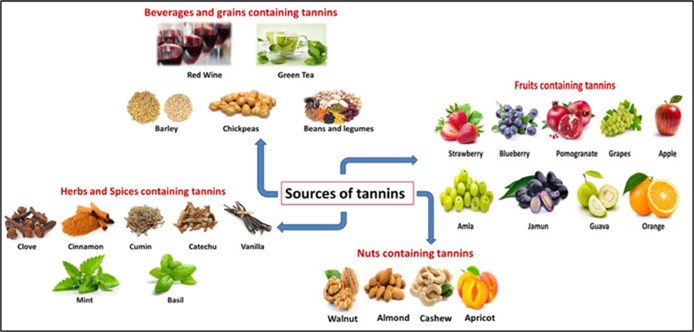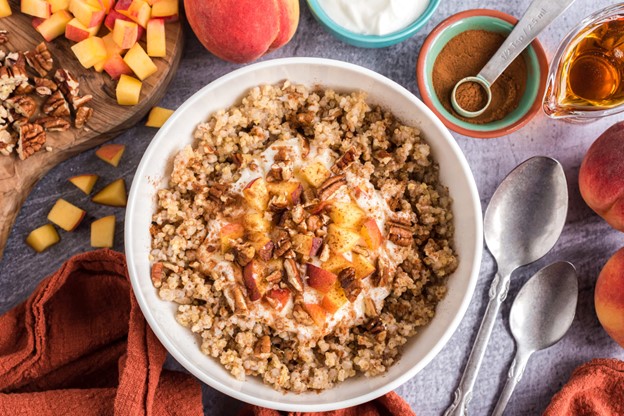TANNINS: What They Are and Why They’re Good For Us!
Research that showed up on a favorite site, www.foodrevolution.org, shows that tannins, compounds produced by plants to protect themselves, can also protect us from inflammation, microbes, and free radical damage.

They’re part of the family of about 8,000 polyphenols. Some of the most well-known include resveratrol (from red grapes, red wine, and cocoa), curcumin (in turmeric), and anthocyanins (found in blueberries and other dark berries).
Like polyphenols, tannins act as antioxidants, helping to prevent and reverse cellular damage caused when free radicals attack our cells.
However, some tannins are also considered anti-nutrients, compromising our ability to absorb minerals and protein.
So, if they’re act as antioxidants, but are also considered an anti-nutrient, the question is “Are they good or bad for us?” The answer to this complex question is “it depends.” It depends on whether you suffer from protein or iron deficiency, and whether you’re consuming purified tannins in large concentrations or just getting some incidental tannins from food.

Sensitivity to them can cause headaches, facial flushing, and digestive problems. If you worry about tannins, you can reduce their concentrations. Steeping tea for shorter periods of time or choosing low-tannin tea varieties (like herbal teas) will reduce their effect. Subjecting them to heat (roasting, slow cooking, pressure cooking, and baking) are effective ways to reduce tannin concentration. And avoiding the peel of certain fruits, especially citrus fruits, also reduces tannin exposure.
But the thing is, they’re multitalented and much research shows they offer powerful protection from a variety of health threats. For instance:
Tannins have a strong effect on heart disease by helping to slow the hardening of the arteries, keeping blood pressure in balance, and lowering cholesterol levels.

Tannins are shown to inhibit cancer formation by triggering apoptosis (programmed death) in cancer cells, inhibiting their proliferation, and making it harder for them to survive. Studies show they inhibit carcinogenic processes throughout the body, including in the lungs, prostate, gums, breast (especially estrogen receptor-positive cancers), liver, colon, rectum, prostate, and ovaries.
Scientists have found tannins can protect us from some of the nastiest viruses and bacteria around, including influenza, Papillomaviruses, noroviruses, herpes, HIV, staph, E. coli, strep, and listeria. And they’ve proven to be among the most prolific free radical scavengers, preventing many of the chronic diseases linked to unchecked free radical activity.
Suitably impressed? Me too. So let’s look at foods and beverages that are high in tannins:

GREEN TEA and HIBISCUS TEA.
HERBS: LICORICE, MINT, ROSEMARY, CORIANDER, SAGE.
SPICES: CINNAMON, CLOVES, GINGER, BLACK CUMIN SEEDS.
FRUIT: GRAPES, APPLES, PEARS, BERRIES, PEACHES, PLUMS, POMEGRANATES.
WINE (from red grapes).
NUTS: ALMONDS, PECANS, WALNUTS, HAZELNUTS, PISTACHIOS, PEANUTS.
BEANS
CHOCOLATE. (Off the charts compared to other foods.)
I’ll close this tannin tutorial with a recipe a healthy recipe that provides not just a good dose of tannins, but a huge dose of deliciousness as well.

FOR GRAINS
1/4 cup quinoa rinsed well
1/4 cup millet rinsed well
1/4 cup buckwheat rinsed well
1 1/2 cups water
1 pinch salt (optional)
FOR MIX-INS
1 cup unsweetened plant-based yogurt
1/2 cup cubed peaches
2 tablespoons chopped pecans
1 teaspoon ground cinnamon
3 tablespoons pure maple syrup or date paste
Directions:
Add Recipe to Cook'n

They’re part of the family of about 8,000 polyphenols. Some of the most well-known include resveratrol (from red grapes, red wine, and cocoa), curcumin (in turmeric), and anthocyanins (found in blueberries and other dark berries).
Like polyphenols, tannins act as antioxidants, helping to prevent and reverse cellular damage caused when free radicals attack our cells.
However, some tannins are also considered anti-nutrients, compromising our ability to absorb minerals and protein.
So, if they’re act as antioxidants, but are also considered an anti-nutrient, the question is “Are they good or bad for us?” The answer to this complex question is “it depends.” It depends on whether you suffer from protein or iron deficiency, and whether you’re consuming purified tannins in large concentrations or just getting some incidental tannins from food.

Sensitivity to them can cause headaches, facial flushing, and digestive problems. If you worry about tannins, you can reduce their concentrations. Steeping tea for shorter periods of time or choosing low-tannin tea varieties (like herbal teas) will reduce their effect. Subjecting them to heat (roasting, slow cooking, pressure cooking, and baking) are effective ways to reduce tannin concentration. And avoiding the peel of certain fruits, especially citrus fruits, also reduces tannin exposure.
But the thing is, they’re multitalented and much research shows they offer powerful protection from a variety of health threats. For instance:
Tannins have a strong effect on heart disease by helping to slow the hardening of the arteries, keeping blood pressure in balance, and lowering cholesterol levels.

Tannins are shown to inhibit cancer formation by triggering apoptosis (programmed death) in cancer cells, inhibiting their proliferation, and making it harder for them to survive. Studies show they inhibit carcinogenic processes throughout the body, including in the lungs, prostate, gums, breast (especially estrogen receptor-positive cancers), liver, colon, rectum, prostate, and ovaries.
Scientists have found tannins can protect us from some of the nastiest viruses and bacteria around, including influenza, Papillomaviruses, noroviruses, herpes, HIV, staph, E. coli, strep, and listeria. And they’ve proven to be among the most prolific free radical scavengers, preventing many of the chronic diseases linked to unchecked free radical activity.
Suitably impressed? Me too. So let’s look at foods and beverages that are high in tannins:

GREEN TEA and HIBISCUS TEA.
HERBS: LICORICE, MINT, ROSEMARY, CORIANDER, SAGE.
SPICES: CINNAMON, CLOVES, GINGER, BLACK CUMIN SEEDS.
FRUIT: GRAPES, APPLES, PEARS, BERRIES, PEACHES, PLUMS, POMEGRANATES.
WINE (from red grapes).
NUTS: ALMONDS, PECANS, WALNUTS, HAZELNUTS, PISTACHIOS, PEANUTS.
BEANS
CHOCOLATE. (Off the charts compared to other foods.)
I’ll close this tannin tutorial with a recipe a healthy recipe that provides not just a good dose of tannins, but a huge dose of deliciousness as well.

Three-Grain Peaches and Cream Breakfast Bowl
Ingredients:
FOR GRAINS
1/4 cup quinoa rinsed well
1/4 cup millet rinsed well
1/4 cup buckwheat rinsed well
1 1/2 cups water
1 pinch salt (optional)
FOR MIX-INS
1 cup unsweetened plant-based yogurt
1/2 cup cubed peaches
2 tablespoons chopped pecans
1 teaspoon ground cinnamon
3 tablespoons pure maple syrup or date paste
Directions:
1. Heat water and grains in a medium saucepan on medium-high heat until boiling.
2. Lower heat to simmer, cover, and cook for 15 minutes or until the grains are tender. Remove from heat but leave the lid in place for 10 minutes.
3. Divide grains between bowls.
4. Top with yogurt, peaches, pecans, and cinnamon. Stir to combine.
5. Add sweetener of choice.
NOTES
Substitutions: Substitute quinoa, millet, or buckwheat with rolled oats or your favorite grain of choice. Substitute peaches with nectarines, plums, apricots, or your favorite stone fruits. Substitute pecans with walnuts, almonds, hazelnuts, or macadamia nuts.
Nut-Free: Substitute pecans with hemp seeds, chia seeds, sunflower seeds, or pumpkin seeds.
Prep Ahead: Prepare the grains ahead of time and store for up to 3 days before using.
Storage: Store in an airtight container in the refrigerator for up to 5 days.
2. Lower heat to simmer, cover, and cook for 15 minutes or until the grains are tender. Remove from heat but leave the lid in place for 10 minutes.
3. Divide grains between bowls.
4. Top with yogurt, peaches, pecans, and cinnamon. Stir to combine.
5. Add sweetener of choice.
NOTES
Substitutions: Substitute quinoa, millet, or buckwheat with rolled oats or your favorite grain of choice. Substitute peaches with nectarines, plums, apricots, or your favorite stone fruits. Substitute pecans with walnuts, almonds, hazelnuts, or macadamia nuts.
Nut-Free: Substitute pecans with hemp seeds, chia seeds, sunflower seeds, or pumpkin seeds.
Prep Ahead: Prepare the grains ahead of time and store for up to 3 days before using.
Storage: Store in an airtight container in the refrigerator for up to 5 days.
Recipe formatted with the Cook'n Recipe Software from DVO Enterprises.
 Alice Osborne
Alice Osborne
Weekly Newsletter Contributor since 2006
Email the author! alice@dvo.com
